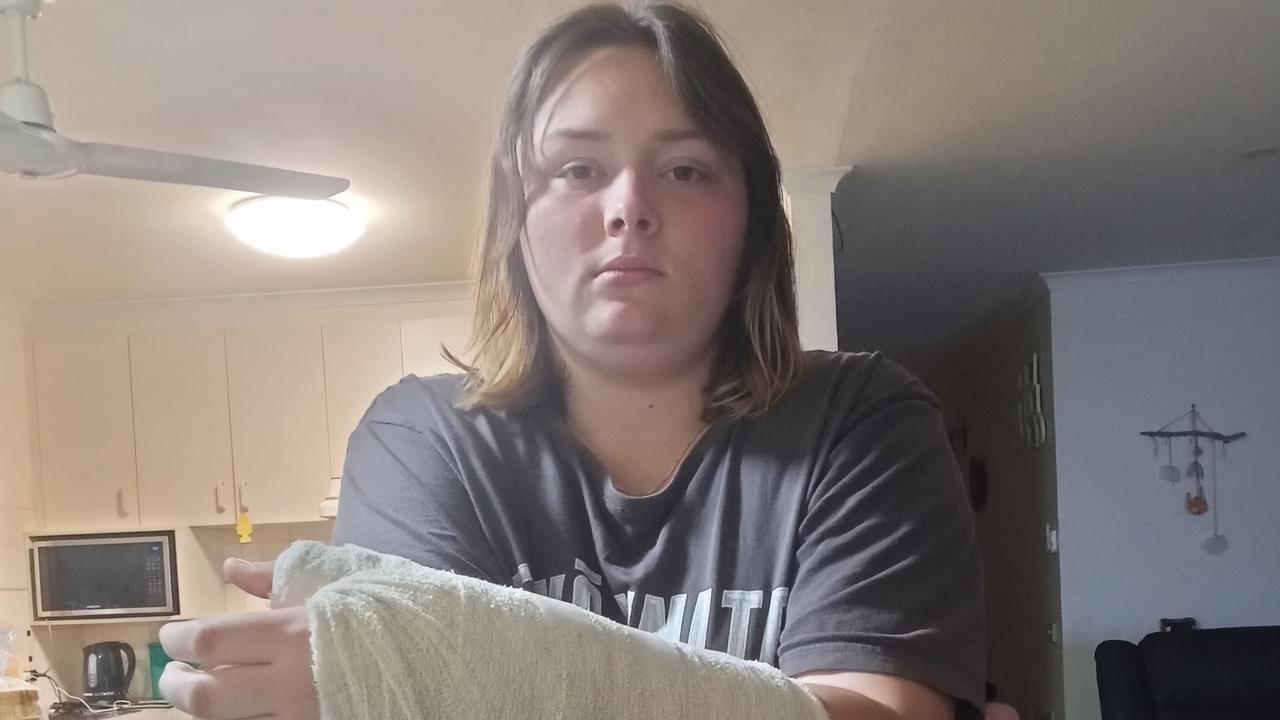Brownlow medallists Patrick Cripps and Tom Mitchell reveal special bond and thoughts on AFL ‘fame’
Patrick Cripps and Tom Mitchell are Brownlow medallists that share a special bond and passion to help others, especially kids. This is why.
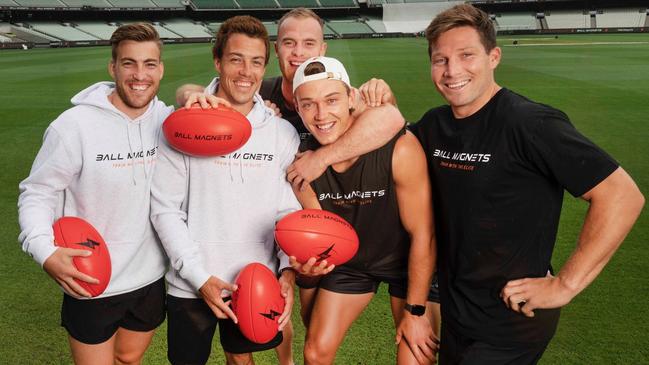
News
Don't miss out on the headlines from News. Followed categories will be added to My News.
Tom Mitchell and Patrick Cripps are both Brownlow medallists with a great perspective on life. But it has changed over time. This is what they’ve learnt, what they wish they knew years ago, and how they formed their new venture that is helping the next generation with their skills, and in time, their mental wellbeing.
HM: Does winning the Brownlow change your life?
TM: It sounds odd, but it does. It doesn’t make you a better person, but you are always “Tom Mitchell, Brownlow medallist” which to be honest, is pretty cool.
PC: I’m a newbie but I have to say I like it. The first week was hectic and raw and a bit overwhelming. You get inundated with things to do. But the surreal piece is that everyone loves their footy, and when footy is the centre of attention that week, on the biggest night, you are up there talking. It’s been so nice, but it’s crazy. All the guys that I looked up to when I grew up were Brownlow medallists. Now I’m one myself – it hasn’t sunk in yet.
TM: Like Patty, I used to love watching the night growing up. In his case, there’s never been a more popular or deserving winner. That room was buzzing. You need to pinch yourself. You’re just the kid that grew up playing footy and then you’re in this big room with the best players in the competition, the biggest names in footy, and you are the centre of attention. It’s a bizarre feeling, it’s hard to describe. It was a bloody proud moment.
HM: One in 21 Australians are members of AFL clubs, people paint their face, cry, scream and think about football more than anything else in life. We love it. Can you put your finger on why?
PC: Because it’s Australian. Aussies are social people, we love a good time, we’re friendly, and love a beer. When I grew up in the country, footy was a way to socialise, that was our meeting point, our glue. It didn’t matter what you did throughout the week, for a country kid, footy was the place you met on the weekends.
TM: AFL is like a religion. It’s all people talk about from Monday to Friday, and then for the next week it’s stories. People are so passionate, it brings a lot of entertainment, enjoyment. It’s escapism too.
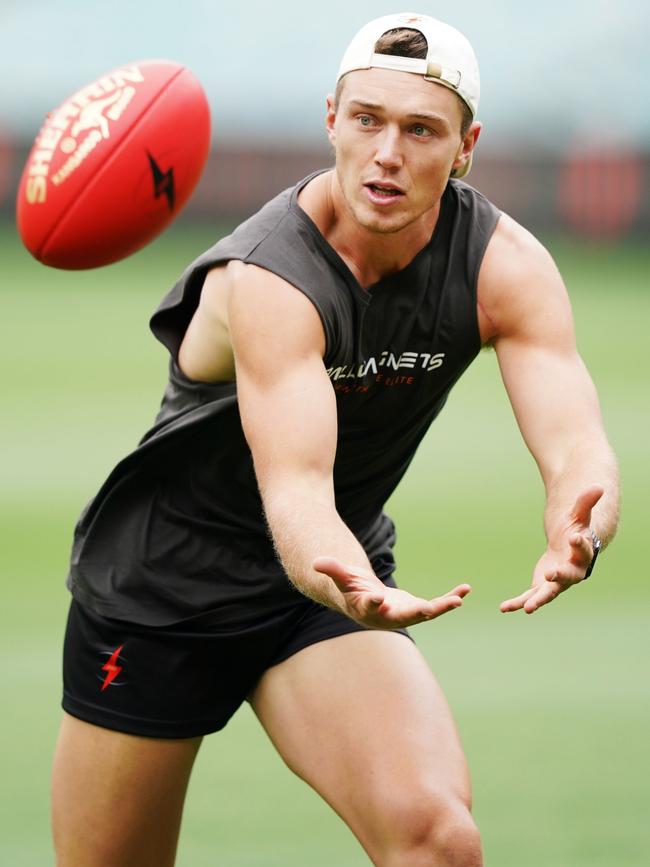
HM: You guys, whether you like it or not, are idolised by hundreds of thousands. It’s amazing what an impact you can have. Like Federer has had. Or Joel Selwood – he changed the life of Sam Moorfoot – what a privilege that is.
TM: When you first start out, you’re tunnel visioned, narrow minded, but as you grow and become more mature, it’s almost like a responsibility because you can have such a positive impact. Little things, like when you meet people in the street, you realise a conversation can really brighten up someone’s day and make a difference. People will remember those moments and take it with them forever. You realise how much of an impact you can have.
PC: What you say is important. On the night, I wish I said to kids, “don’t be afraid to dream big. If you work hard at something and have purpose behind it, and have fun doing it, who knows what could happen”. I dreamt of playing AFL but never dreamt of winning the Brownlow. Suddenly, you’re there.
TM: You mentioned Federer before, and it’s impossible to find someone that doesn’t like him. That comes back to character, that grace that he has. His biggest rival was crying because he was retiring. The way he carries himself on court, off court, he’s the perfect role model. LeBron James is another one, and we don’t know these people personally. If they are that big, how have they not had any sort of slip up? They are so measured, perfect every time we have seen them, but how? That’s the gold standard.
PC: I was listening to Ash Barty talk, through the work she does with Ben Crowe, she talks about two identities. When I was watching that, it showed me two identities of people that when they play, they’re Roger Federer the tennis player, Nadal the tennis player, competitors going at it, but it doesn’t mean they can’t have a relationship off court. When Tom and I play each other, we’re bashing each other, for two hours, but once the game finishes, you’re mates. Once you leave the arena, you go home, and you’re Patty the person. Whether I played well or not, I’m still the same guy.
TM: That’s what players struggle with, associating their worth and value with their footy performance, when it should be so separate.
HM: Is that something you wish you had known when you were walking into the system years ago?
TM: Yes, but every player still struggles with it. There’s such a lens on footy, so if you don’t perform to the level that you or others expect, you feel like you’ve let people down. That has an impact on you. I have improved a lot at dealing with it but I see so many young players come into the league, and on our list, who haven’t been able to do that yet. That’s a natural part of everyone’s journey.
PC: When a player goes well, they get the rise: “Here it all comes, I haven’t had this before.” But every rise will always have a dip. You feel that good about yourself in the rise but the dip is always coming, it doesn’t matter in what stage of life, it ebbs and flows. You need to go through it to learn, and learn it’s never as good as it seems, and never as bad either.
HM: Paddy, how did the Seattle Seahawks come into your life?
PC: I was driving back to the farm during Covid and our masseuse, Lozza, we are always talking about high performance and ways to get better. She sent me this podcast, and the podcast was with Pete Carroll. I just listened to him, he’s big on optimism, hope, finding a way forward, building good energy around the place having a good environment. I was listening, and thinking, “this is the stuff I love.’ Funnily enough, I started listening to a podcast called Finding Mastery, which is with a guy called Dr Michael Gervais, he’s a high-performance psychologist. I didn’t know that when I started listening but he and Carroll worked together at the Seahawks. From that, they sent out a high-performance course called Compete to Create. I had the time during Covid. It was a 10-week course, and I was in hook, line and sinker. I started chatting with Andrew Russell, our high-performance manager, on ways to find that extra one per cent. I bought his book, did that course, and went on that journey. Now, I’m passionate in psychology. I’m doing a degree in it.
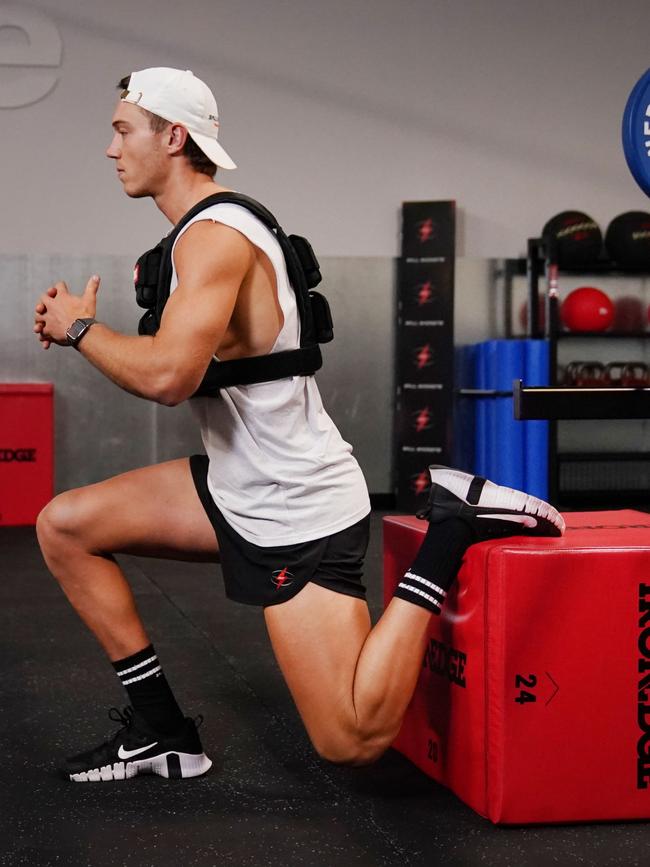
HM: And loving it?
PC: A lot. The course had a lot of self-discovery. I just found this passion that I always knew I had but it turned into how I could help other people do better.
HM: What did you learn about yourself as you went through the course?
PC: It makes you reflect on what your values are, what you stand for, and what’s important to you. It gave me the mental tools on how to get the best out of yourself. It unpacked a lot of questions. I started reading a heap of books, I enjoy reading self-help books.
HM: Were you a reader before that?
PC: It was around that time I started getting into them. I bought some autobiographies, some self-help books, and went on this massive journey to tap into what this passion was. It lit a fire in me. I’d come back from training, I’d be doing this course, reading, taking notes. I caught up with you, we had zoom calls, I started reaching out to a lot of different people. I’m going to go after this and tap into as many people that I think are interesting, or can try and get access too, and just see where it goes.
HM: It helps you with football but I assume it helps you with your relationship with Mon, and broader life?
PC: Without a doubt. Everything. It’s helped me more in life than in footy. It was a compound effect where all this stuff I was doing didn’t help in the first 12 months. I was learning. Then ….
HM: … like an aeroplane … it suddenly takes off?
PC: Exactly. I got into meditation big time throughout that period because a lot of those courses said it could really help you. I had to give it a go. I just started doing 10 to 20 minutes a day, every day, and I still do it now. It’s amazing how much that can impact my wellness, wellbeing, happiness, mood, and performance. I was getting more rest, was enjoying training more, and it was just a big snowball effect.
TM: You can see it in him. We are all from different clubs but a lot of us lean on each other at different times for advice. You can feel it, and see it, Paddy’s approach to things. The optimism, the work he’s done, the research on how to approach all situations and have that “it’s never as bad as it seems” approach, I don’t know how to explain it, but as a mate, you see it.
HM: Crippa, you and I started speaking regularly in 2019 ahead of the Brownlow. The shift that I have seen with you since then, is that regardless of the situation? There’s always a solution.
PC: Always.You just work your way through it, without panic. Sometimes you go through some tough times, like everyone does, and at that time you feel like you’re suffocating a bit but just dig a bit deeper and you’ll find out more about yourself. You’ll find a way forward. Everyone goes through sh--, even me, but if you look through my life … they aren’t big problems. I was doing something with Sam Docherty the other day, that perspective is so important. At the time, your life might be full on, and it is full on, but once you come out of that you look back, and one of my best mates has just been through chemo, he’s done two knees, lost his old man – what I’m going through really isn’t that bad.
HM: Well said. You two are in business together, with Lachie Neale. Ball Magnets. Why couldn’t Ball Magnets – which is teaching physical skills, also have the mental side of it? You teach the skills of football, and you also teach your stuff that you love around the mind?
TM: We’ve spoken about this. If a 12-year-old is hearing you say, “don’t worry if you don’t get the touches this week, you’re still the same person”. There are so many things that we want to explore. The core of it is the physical aspect and the footy skills, the training, and the tips on how to play your position but there’s a whole other area of diet, nutrition, which in turn helps your mood and happiness, your mental skills, sleep tips. We have dabbled in it, but we are a bit under-resourced now. Eventually, that would be Patty’s area. He’d run the mental side of things. That would help so many people, in footy or away from it.
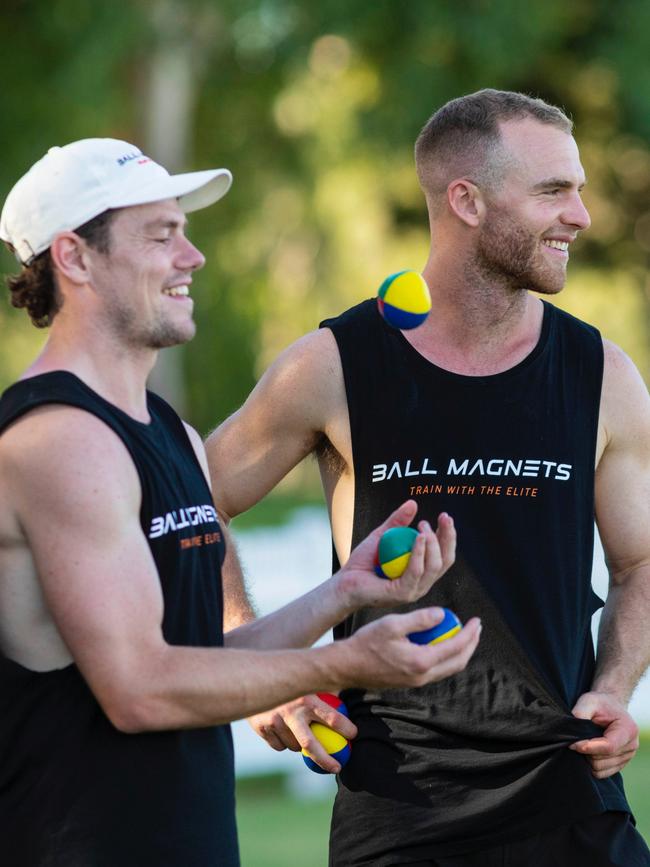
HM: How do three Brownlow medallists end up owning a business together?
PC: Tommy is the main driver. He’s a machine, he doesn’t stop. We played school footy against each other but we didn’t really know each other. We built a relationship through a mutual friend.
TM: Like Patty’s journey, when I broke my leg and I started thinking about life after footy, I was helping some junior footy clubs but when Covid hit, I couldn’t help them. The kids love the players. The kids and the parents were asking, “what can we still do?” I started writing some programs, and then a few of the parents said “why don’t you do a website?” That transformed into an app, and it was all about connecting with kids, and still giving them access to the players, because that’s what makes them happy. They want to listen to the players. I was like that as a kid, I still have memories. I can tell you exactly what oval I was at when I met Anthony Koutoufides, Wayne Campbell, or Scott Camporeale. I still remember where and when, and kids these days are the same. How can we create these memories and experiences, and get a wider reach? With an app. The idea started there and then I reached out to Crippa and Lachie, told them I had this idea, and they thought it sounded great. I’ve put thousands of hours into it and couldn’t have done it without the boys. They have got right behind it, they love the concept of it, and love the impact we can have. All people who love footy, coaches, parents, they use the app as well.
PC: A lot of schoolteachers use the app for ideas with drills.
TM: And it’s not only for the elite players who are trying to make AFL, it accommodates everyone. Be the best you can be. That’s how it started. We wanted to inspire kids and get them outside, not keep them locked inside playing PlayStation. Use Ball Magnets. Have the tech become a positive.
PC: When he approached me, going into it, I could get more kids outdoors with their mates. That was what we did growing up, I didn’t have a PlayStation.
TM: We are all very passionate about other sport, and one day we might have AFL, basketball, tennis, soccer, cricket, with the best Australian athletes running it, giving the kids the best access and insight possible. It’s free. We played around with the ideas of how best to do it and there are apps that have subscriptions but making it so accessible allows the kid from the outer suburbs who may not be able to afford it to access it. It gets everyone involved and gives everyone access to the players, which is what we want to do.
PC: Wellbeing is the cornerstone of everything these days, mental, physical, financial, they all affect your health. Everyone wants to see young kids chase their dreams, not only young boys, but young girls.
TM: Erin Phillips is with us as well.
PC: She’s got us all covered. She’s the boss.
TM: She’s a freak athlete, a star.
PC: AFLW is going crazy which is so good to see and the participation has gone through the roof. Reaching out to other sports, you’ve got males, females, getting outdoors and playing with their mates. It’s cool to see.
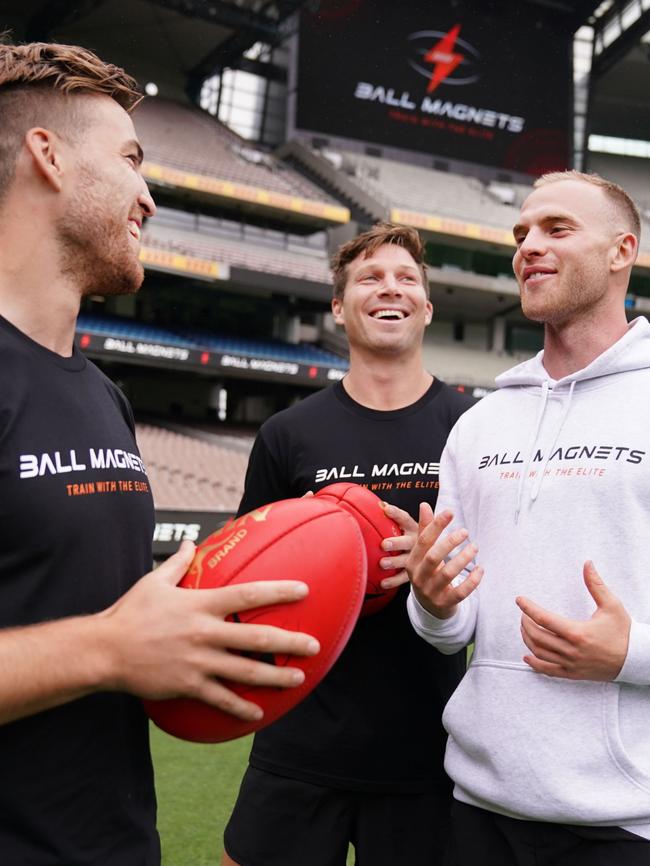
HM: You are unbelievably well rounded – how do you avoid the noise that is out there?
PC: I went through the fire last year. Although it was tough, sometimes you’ve got to go through it to gain greater perspective. It made me grow. I went back home, went to work, and I’m big on nothing being as good or bad as it seems. If I ever see something written about me, I look at it from a bird’s eye view. I remove myself from it, look down on it and don’t judge it either way. That person that may have potted me 12-months-ago is now pumping me up. That’s the way the media works and it’s nothing against the media. They get paid to have an opinion. Another way I look at it, is they do that to put food on the table for their kids, they’re doing their job. Remove yourself from it, don’t take it personally, go about your business, put the work in, plan the week, do the week, and be a good person. That’s what’s helped me the most.
HM: Be a good person, regardless of your performance? It doesn’t change you as the individual.
PC: No one’s perfect, everyone makes mistakes but don’t be afraid to make them.
HM: What’s the hardest piece of fame?
TM: I wouldn’t say I’m famous, but the scrutiny. But if you look at it from another perspective, it’s only scrutiny because people hold you in high regard, otherwise they wouldn’t have an opinion on you at all. If you can take it as a compliment, in a weird way, it means you are important enough.
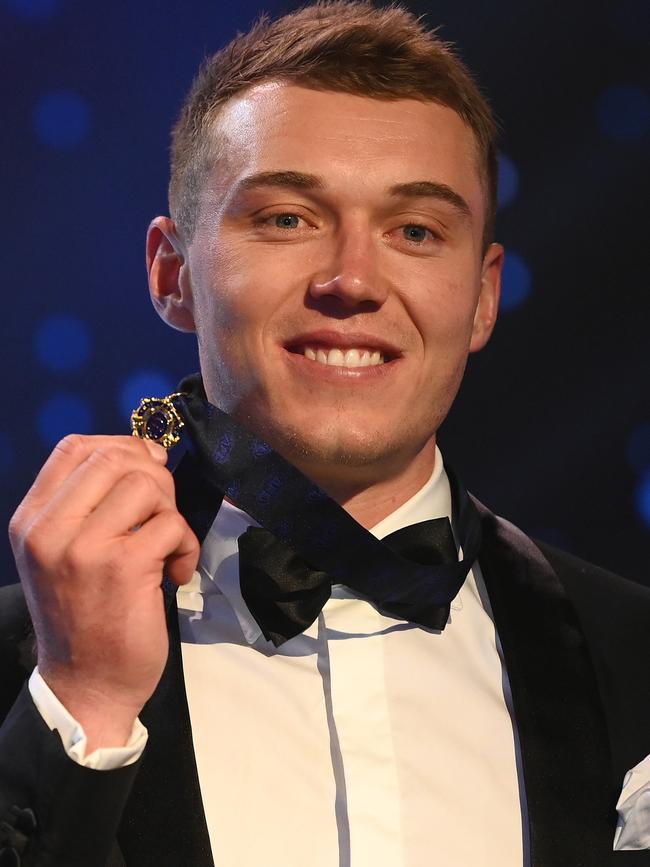
HM: How hard is it to be so aware, like Joel was on Grand Final Day? When I say aware, aware of everyone else around you.
TM: He is the gold standard. It comes with maturity, realising that AFL is a game and when you have people coming to the footy club with life threatening illnesses, footy is so great at helping people and making incredibly special days for families who are really struggling. Little things that I do, I make sure that every game we run through the banner there is a kid there. I always make sure I go up to them, I shake their hand, give them the ball, run through the banner with them and have a chat. It just becomes easy. When I first started playing footy it was all about me. If there are ever visitors at the club, whether they be fans, or family, always go and say hello, get their name, and have a chat. That sticks with people. It’s something I’ve become a lot better at and it comes back to realising that you can have an impact. Any opportunity, whether it’s someone new or not, bring them in, make them feel welcome and as comfortable as possible.
HM: If you went and wrote a letter to yourself that you were going to read as a 16-year-old, what’s the first line of guidance?
TM: There’s more to life than footy. Back then, you think footy is everything, when you want to make it so badly. We love it, we are passionate about it and put everything into it, blood, sweat and tears, the most important thing is the health of your family. That’s what really makes you happy. If you have things going on in your life, it affects your footy, so if everything is about your family and friends, you’re in a good place.
PC: Enjoy it, have fun, dream big, make lifelong friendships, work hard, listen to people you trust and respect, and it’ll all go quicker than you think.
Ball Magnets is pleased to advise those who download the app between today and Sunday November 6 will go into a draw to win one of eight “athlete packs” from Ironedge valued at $225 each, and 10 winners aged between 10-21 a chance to attend a Ball magnets AIA Vitality training session with Tom and Patrick to be run early in the new year.




